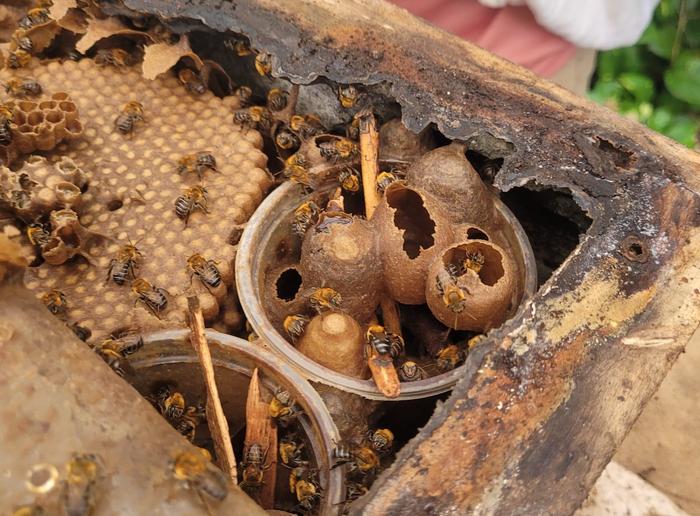A study conducted by Brazilian researchers affiliated with São Paulo State University (UNESP), the Federal University of São Carlos (UFSCar) and the Federal University of Viçosa (UFV) has shown how three pesticides widely used by farmers in Brazil – imidacloprid, pyraclostrobin and glyphosate – affect native stingless bees of the species Melipona scutellaris. Whether they are used singly or combined, the pesticides impaired the bees’ ability to move about and weakened their defenses. An article describing the results of the study is published in the journal Environmental Pollution.

Credit: Graziele Luna
A study conducted by Brazilian researchers affiliated with São Paulo State University (UNESP), the Federal University of São Carlos (UFSCar) and the Federal University of Viçosa (UFV) has shown how three pesticides widely used by farmers in Brazil – imidacloprid, pyraclostrobin and glyphosate – affect native stingless bees of the species Melipona scutellaris. Whether they are used singly or combined, the pesticides impaired the bees’ ability to move about and weakened their defenses. An article describing the results of the study is published in the journal Environmental Pollution.
Indiscriminate use of pesticides and their adverse effects on the survival of bees are under discussion worldwide, and a great deal of research is being done on the subject, yet most of the findings published to date focus on European and North American bee species. In Brazil, native stingless bees like M. scutellaris are the priority because of their vital role in pollinating many wild plants and economically important crops.
In the study, which was conducted under the aegis of the FAPESP Research Program on Biodiversity Characterization, Conservation, Restoration and Sustainable Use (BIOTA-FAPESP) and supported via two projects (17/21097-3 and 21/09996-8), the researchers assessed the sublethal effects of the three pesticides on the bees’ behavior, morphology and physiology by orally exposing them to the substances singly and in combination for 48 hours. The results were compared with those of a control group.
The harm done by the pesticides was clear. Bees fed a solution containing one or more of the pesticides in solution walked less and moved more slowly. In addition, their fat body, a vital organ for energy storage, metabolism and immune response regulation, underwent morphological change.
“We found that the pesticides, both singly and combined, interfered severely with the bees’ behavior, damaging their fat body and impairing the activity of important proteins for the immune system and cell survival,” said Cliver Fernandes Farder-Gomes, first author of the article and a researcher at UFSCar’s Center for Agrarian Sciences (CCA).
According to Farder-Gomes, the results show that even if the bees survive exposure to the pesticides, their immune system is weakened and cannot adequately combat pathogenic bacteria, so they become more prone to infections.
“The death of bees is always shocking, but it should be borne in mind that it can often be even more hazardous if they survive exposure to pesticides because colonies are weakened and made smaller, with adverse effects on honey production and pollination, which in turn means losses to fruit and vegetable production,” said Roberta Cornélio Ferreira Nocelli, last author of the article. She is a professor at CCA-UFSCar and chairs an International Commission for Plant-Pollinator Relationships (ICCPR) working group that is developing methods to test for toxicity in Brazilian native bees,
Public policy
To complement these results and provide a more comprehensive picture of the adverse effects of the three pesticides, the researchers plan to analyze their influence on the expression of other proteins and find out how they are affecting other native bee species.
According to Osmar Malaspina, penultimate author of the article and a professor at the Institute of Biosciences of UNESP’s campus in Rio Claro, the study led by Farder-Gomes reveals impacts with long-term consequences for biodiversity and food security and should be used by public policymakers as a rationale for tighter restrictions. He cites as examples the contributions made in recent decades by the Ecotoxicology and Bee Conservation Laboratory (LECA-UNESP) and the Research Group on Bees and Environmental Services (ASAs-UFSCar), led by himself and Nocelli.
“Our 80-plus articles and books, among other works, have been used over the years, above all by IBAMA [Brazil’s main environmental law enforcement agency], to restrict the use of agrochemicals such as fipronil, the insecticide that has been most associated with the global decline of bees,” Malaspina said.
Nocelli stressed that he and his colleagues have no interest in hindering Brazilian agriculture. On the contrary, the point of scientific research is to improve it. “We want agriculture to be more sustainable and to go hand in hand with conservation. This is the only way to assure future food security,” he said.
About São Paulo Research Foundation (FAPESP)
The São Paulo Research Foundation (FAPESP) is a public institution with the mission of supporting scientific research in all fields of knowledge by awarding scholarships, fellowships and grants to investigators linked with higher education and research institutions in the State of São Paulo, Brazil. FAPESP is aware that the very best research can only be done by working with the best researchers internationally. Therefore, it has established partnerships with funding agencies, higher education, private companies, and research organizations in other countries known for the quality of their research and has been encouraging scientists funded by its grants to further develop their international collaboration. You can learn more about FAPESP at www.fapesp.br/en and visit FAPESP news agency at www.agencia.fapesp.br/en to keep updated with the latest scientific breakthroughs FAPESP helps achieve through its many programs, awards and research centers. You may also subscribe to FAPESP news agency at http://agencia.fapesp.br/subscribe.
Journal
Environmental Pollution
DOI
10.1016/j.envpol.2024.123783
Article Title
Exposure of the stingless bee Melipona scutellaris to imidacloprid, pyraclostrobin, and glyphosate, alone and in combination, impair its walking activity and fat body morphology and physiology
Article Publication Date
13-Mar-2024




